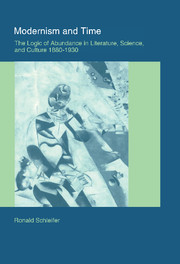Book contents
- Frontmatter
- Contents
- Preface
- Introduction:Post-Englightment Modernism and the experience of time
- PART I POST-ENLIGHTENMENT APPREHENSIONS
- 1 The Enlightenment, abundance, and postmodernity
- 2 Temporal allegories: George Eliot, Walter Benjamin, and the redemption of time
- 3 The second Industrial Revolution: history, knowledge, and subhectivity
- PART II LOGICS OF ABUNDANCE
- Notes
- References
- Index
1 - The Enlightenment, abundance, and postmodernity
Published online by Cambridge University Press: 22 September 2009
- Frontmatter
- Contents
- Preface
- Introduction:Post-Englightment Modernism and the experience of time
- PART I POST-ENLIGHTENMENT APPREHENSIONS
- 1 The Enlightenment, abundance, and postmodernity
- 2 Temporal allegories: George Eliot, Walter Benjamin, and the redemption of time
- 3 The second Industrial Revolution: history, knowledge, and subhectivity
- PART II LOGICS OF ABUNDANCE
- Notes
- References
- Index
Summary
We are in this techno-scientific world like Gulliver: sometimes too big, sometimes too small, never at the right scale. Consequently, the claim for simplicity, in general, appears today that of a barbarian.
From this point, it would be necessary to consider the division of mankind into two parts: one part confronted with the challenge of complexity; the other with the terrible ancient task of survival. This is a major aspect of the failure of the modern project (which was, in principle, valid for mankind as a whole).
Jean-François Lyotard, “Defining the Postmodern” (1993: 173)Many scholars have argued that great intellectual and social shifts of the seventeenth and eighteenth centuries – what has recently come to be called the early modern period of Western culture, but what has been called the Enlightenment – culminated in the triumph of the scientific-secular middle-class culture of the late nineteenth and early twentieth century. Such a triumph manifested itself in what Fredric Jameson describes as
one of the most active periods in human history, with all the smoke and conveyance inherent in new living conditions and in the rapid development of business and industry, with the experimental triumphs of positivistic science and its conquest of the university system, with all the bustling parliamentary and bureaucratic activity of the new middle-class regimes, the spread of the press, the diffusion of literacy and the rise of mass culture … [in] an increasingly consumer-oriented civilization. (1981: 251)
- Type
- Chapter
- Information
- Modernism and TimeThe Logic of Abundance in Literature, Science, and Culture, 1880–1930, pp. 35 - 66Publisher: Cambridge University PressPrint publication year: 2000



